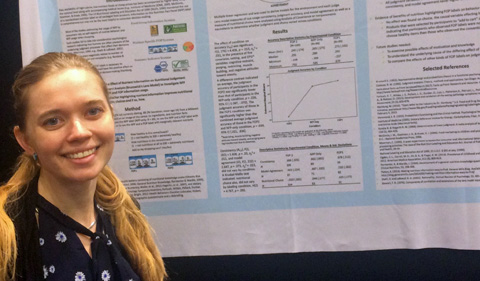
Kristina Carter presents a poster at the 8th Annual Conference of the Society for Judgment and Decision Making in Vancouver, Canada.
Psychology graduate student Kristina Carter and Dr. Claudia González Vallejo presented their research on consumer nutritional judgment and food labels at the 2017 38th Annual Conference of the Society for Judgment and Decision Making in Vancouver, Canada.
Carter presented a poster on their research titled “Nutrient-Specific System v. Full Fact Panel: Examining the Effect of FOP Labels on Nutritional Judgment and Choice.”
González Vallejo had the opportunity to take a photo with Nobel Laureate Dr. Richard Thaler, who was awarded the 2017 Nobel Prize in Economic Sciences. “Dr. Thaler is the second member of our society to receive the Nobel Prize in Economic Sciences. The previous winner was Dr. Daniel Kahneman, 2002,” notes González Vallejo.
Abstract for “Nutrient-Specific System versus Full Fact Panel: Understanding Nutritional Judgment Using Lens Model Analysis“: Building on previous empirical research that demonstrates that amount and complexity of information is negatively related to judgment accuracy, this study used an experimental design to evaluate nutritional information labels of varying complexity. Lens model analysis (Brunswik, 1955; Cooksey, 1996; Hammond, 1955; Stewart, 1976) was used to quantitatively compare individuals’ judgment accuracy to a gold standard nutritional quality criterion in three conditions that implemented front-of package (FOP) labels. The conditions were: no highlighted information, information highly related to nutritional quality highlighted, and information marginally related to nutritional quality highlighted. Findings indicate that different FOP labels had different effects on accuracy but there were no effects of FOP labeling on judgment consistency, model agreement, or nutritional choice. Implications for understanding efforts to improve American food choices and reducing obesity are discussed.




















Comments